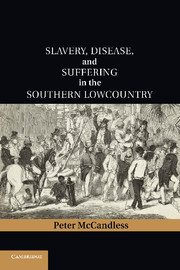Book contents
- Frontmatter
- Contents
- List of Figures
- List of Maps
- Preface
- Acknowledgments
- List of Abbreviations Used in Notes
- MAP 1 The Lowcountry, Charleston, and the Caribbean region
- MAP 2 The South Carolina lowcountry, showing Anglican parishes and slave proportion of population, c. 1760s
- MAP 3 Charleston Harbor, based on a British map, c. 1780
- MAP 4 The Revolutionary War in the South
- PART I TALK ABOUT SUFFERING
- PART II COMBATING PESTILENCE
- 8 “I Wish That I Had Studied Physick”
- 9 “I Know Nothing of this Disease”
- 10 Providence, Prudence, and Patience
- 11 Buying the Smallpox
- 12 Commerce, Contagion, and Cleanliness
- 13 A Migratory Species
- 14 Melancholy
- Bibliography
- Index
- References
8 - “I Wish That I Had Studied Physick”
Published online by Cambridge University Press: 03 May 2011
- Frontmatter
- Contents
- List of Figures
- List of Maps
- Preface
- Acknowledgments
- List of Abbreviations Used in Notes
- MAP 1 The Lowcountry, Charleston, and the Caribbean region
- MAP 2 The South Carolina lowcountry, showing Anglican parishes and slave proportion of population, c. 1760s
- MAP 3 Charleston Harbor, based on a British map, c. 1780
- MAP 4 The Revolutionary War in the South
- PART I TALK ABOUT SUFFERING
- PART II COMBATING PESTILENCE
- 8 “I Wish That I Had Studied Physick”
- 9 “I Know Nothing of this Disease”
- 10 Providence, Prudence, and Patience
- 11 Buying the Smallpox
- 12 Commerce, Contagion, and Cleanliness
- 13 A Migratory Species
- 14 Melancholy
- Bibliography
- Index
- References
Summary
The God of verse and medic skill
Oft plies the Muses harmless quill,
Not still intent to write and kill.
James Kilpatrick/Kirkpatrick, The Sea Piece, c. 1742The object of [medicine] is not to accumulate wealth, but to promote the health and happiness of the human race.
David Ramsay, 1800MCDOCTORS
In the early 1740s, a young Scottish doctor named John Murray arrived in Charleston. Soon he was writing home to report that he had achieved “incredible” success. South Carolina, he concluded, was “a fine place for a surgeon.” The virulent-disease environment in itself was not much of an attraction, as the lack of adequate medical care in the unhealthiest parts of the world today attests. What made it a fine place was its combination of pestilence and prosperity. As another Scot, Adam Smith, observed in 1776, it is not demand but effective demand that encourages people to supply a need or want. The great wealth of the planters and merchants held the promise of a lucrative medical marketplace, and a supply of Scottish medicos rushed to meet the demand.
Established medical practitioners in late colonial Charleston appear to have earned a comfortable living. During epidemics they could make money “very fast,” according to his cousin, also named John Murray. Another Scottish doctor, Alexander Garden, who arrived in the early 1750s, was soon averaging an income of 500 pounds a year. By the 1770s, he was making several times that much and was reputed the richest doctor in the province. A number of other doctors earned yearly incomes of 500 pounds or more. Many doctors supplemented their incomes by opening shops where they mixed and sold drugs.
- Type
- Chapter
- Information
- Slavery, Disease, and Suffering in the Southern Lowcountry , pp. 151 - 167Publisher: Cambridge University PressPrint publication year: 2011



